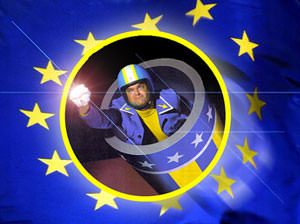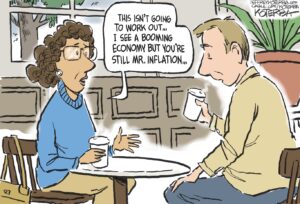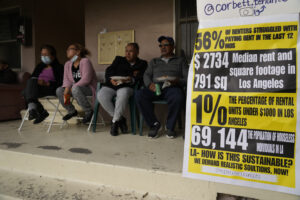Euro Must Have Reform, Not Americanization
On Tuesday the European Council published a new proposal for European monetary reform that rests on continued monetary union -- the source of the present crisis.On Tuesday the European Council published a new proposal for European monetary reform that rests on continued monetary union—the source of the present crisis.
More than two decades ago, the Delors plan for European currency union was initially proposed. Some of us asked whether eight, 12 or 15 different European economies, with their distinct budgets (and budget priorities), fiscal situations and national debts, could really operate with a single currency.
A decade following the Delors plan, the European Central Bank was created, and a Stability and Growth Pact was signed by the EU members who envisaged joining the monetary union. There was no provision for individual currencies to be adjusted in value according to changing circumstances. Notably, this meant no devaluations, a past practice in countries with weaker economies, allowing them to compensate for less productive enterprises and work forces by competing on price.
This, actually, has been what globalization has been all about.
Third World countries competed with advanced countries possessing highly paid workers, heavy investment in technology and productive plant, by paying their workers a pittance of what their American and European rivals had to pay.
Advanced country workers had been able to demand a high standard of living. The great advantage of Third World manufacturing was low standards of living for workers, who were obedient, non-unionized (or non-coerced). They were also experiencing slowly rising living standards, as globalization proceeded, eroding the Western advantage, which is why from the Western viewpoint the overall system is fragile, and becoming more so.
These conditions prevailed at the time when the EU was already operating the “snake in the tunnel,” a continuing effort to bring the varying currency exchange rates (the “snakes”) of the members of the EU into an increasingly close relationship which would eventually become a new currency, upon which was conferred the title of “euro.”
In 1999, the euro formally was created, although it was still a bookkeeping entity. Actual currency only went into circulation in 2002. (France held out for the name “ecu,” which had been used until then for the shared exchange rate average — the merging “snake” currencies forming the European Currency Unit.) “Ecu” happened also to be the name of an ancient French coin, thus pleasing to France’s national ego, as well as being aesthetically more attractive and intriguing than that plain, flat, commonsensical English word euro. But politicians are unimaginative and also tend to resent the French, so euro it became, euro it remained — and as the euro, it now could die.
The objection to full monetary union is obviously that the various prospective members have economies and political characters and tempers too varied to be accommodated in a single institution of economic decision. This seems to me not an opinion but an axiom. It is political reality.
There is no reason why the EU cannot function with respect for this ignored realism, with a euro that includes national currencies. A new monetary union could include a variety of national currencies flexibly accommodating the needs of their own economies and their own trading situations. Their values could change with respect to the euro just as the euro does with respect to the dollar, sterling and other currencies. The euro would vary according to the trading position of EU members, all of them members of the European Central Bank.
Today (June 26) the European Council under Herman van Rompuy has published a new proposal for European monetary reform. It rests on continued monetary union with an exclusive euro — source of the present crisis. I would think this union should be reformed as in the paragraph above. It would become a closely coordinated group of currencies bound together as a single international trading currency, its members mutually guaranteeing bank deposits and providing common debt insurance, under a regulatory system preventing the practices that created the present crisis but with sufficient internal flexibility to accommodate inevitable national divergences. With that, an integrated policy framework would be essential, able to produce a common euro zone policy to promote “sustainable growth, employment and competitiveness” (quoting the van Rompuy document).
A damaging myth has persisted throughout the process of European unification, encouraged by many Americans and accepted by many Europeans who are inadequately acquainted with American realities.
The argument is simple, or simplistic, and for that reason, seductive. It says the American colonies joined together, won freedom, fought over creation of a federal bank and federal judiciary, as well as a strong federal executive (the Civil War). Now it has all worked out, and the Americans live happily with a single currency, rich individual states sharing their advantages and monetary strength with poor states, enjoying a national economy, tax system and budget. This is not so.
The colonies were all English-speaking, and most colonists possessed an English or European culture and education and the Protestant religion. The American union was not constructed from Romania, Italy, Bulgaria, Albania, France, Greece, Belgium, Spain and Portugal. Its present condition is scarcely idyllic, as the political uproar and division in the country during this election year — the breakdown of both executive and congressional government, a politicized judiciary, seemingly irreparable ideologically motivated partisan warfare producing uncontrollable budgets and national debt, and permanent domestic cultural war at home with aggressive ideological warfare abroad — might tend to suggest. The EU has none of this, and I would think needs none of it.
Visit William Pfaff’s Web site for more on his latest book, “The Irony of Manifest Destiny: The Tragedy of America’s Foreign Policy” (Walker & Co., $25), at www.williampfaff.com. © 2012 Tribune Media Services, Inc.
Your support matters…Independent journalism is under threat and overshadowed by heavily funded mainstream media.
You can help level the playing field. Become a member.
Your tax-deductible contribution keeps us digging beneath the headlines to give you thought-provoking, investigative reporting and analysis that unearths what's really happening- without compromise.
Give today to support our courageous, independent journalists.






You need to be a supporter to comment.
There are currently no responses to this article.
Be the first to respond.